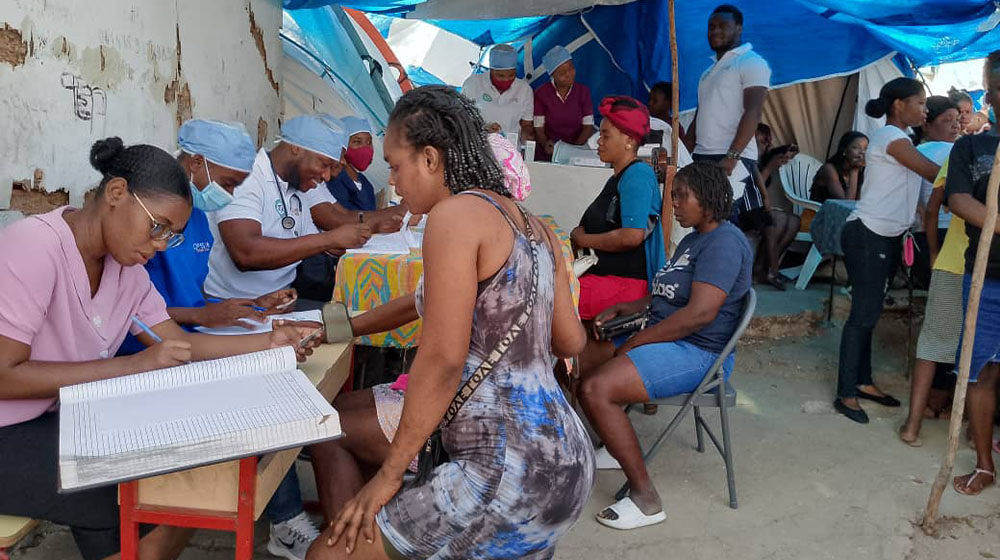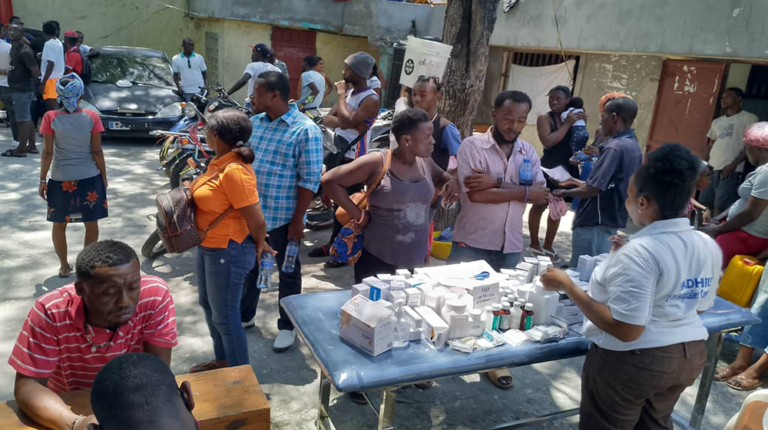port-au-prince, haiti – The National Midwifery Center in Haiti’s capital typically trains around 80 midwives a year and helps thousands of pregnant women safely deliver their babies.
But when armed groups attacked and looted the Port-au-Prince institute in late February, students and staff fled in fear. Many don't even know when or if they'll be able to return.
With the recent alarming spike in gang violence, medical facilities are under near constant attack, with equipment, medicine, and even ambulances being taken away. With most facilities forced to close and staff now evacuated, essential medical, social services and psychological support are dangerously lacking for most people in the capital.

“The few facilities that are still open are not fully functional,” explains Marie-Suze Albert, UNFPA's National Midwifery Advisor for Haiti. “Not all staff are available to work. In some cases, midwives are unable to return to the home to provide care and may have to remain on-site for up to three days.”
Health services are currently extremely limited, with two in five Haitians requiring urgent access. UNFPA estimates that if the violence continues, about 3,000 pregnant women in Port-au-Prince will be left without essential support, and about 500 of them will suffer complications and require emergency obstetric care, including caesarean sections. .
The medical sector is turned upside down
The capital's largest public health facility, the State University Hospital, was closed along with 12 of the 15 UNFPA-supported health facilities. Remaining hospitals are overburdened and armed groups controlling major roads are blocking routes for essential goods such as food, water, medicine and blood supplies. For millions of people, finding safe haven is becoming increasingly difficult.
To reach those most in need, UNFPA and partners deployed two mobile medical teams to five evacuation sites in Port-au-Prince. Dr. Bach-Jean Jumeau, president of the Haitian Society of Obstetrics and Gynecology, called the situation “traumatic and the people are in a very vulnerable position. We are trying to provide as much support as possible, including providing psychological support.”
This difficulty has led to complications, the doctor said, adding, “I have seen many women who had to give birth by C-section before their due date due to anxiety, the stress of repeated extensive travel, and high blood pressure.'' I’ve come,” he said.
The mobile unit currently sees between 150 and 170 people, mostly women, every day. They also provide food and hygiene kits, raise awareness about available services, and provide psychosocial support and emergency shelter in cases of rape and other forms of gender-based violence. If necessary, the unit can transfer patients to a 24-hour community health center operated by our partner FADHRIS, with support from UNFPA.
Women and girls pay the heaviest price
As Haiti's health and protection systems collapse, sexual violence becomes more prevalent. United Nations estimates show that sexual violence will increase by 50% between 2022 and 2023. 80 percent of women and girls report experiencing some form of gender-based violence.
“Since the increase in gang attacks, we have noticed higher rates of early pregnancies, especially in certain accommodation facilities,” Dr. Jean Jumeau told UNFPA.
The risk is especially high in crowded evacuation environments. To support survivors and people at risk, UNFPA and partners operate a hotline that provides counseling, information and referrals.
“Very often, we receive calls from women and girls who are in emotional distress,” said Yolet Jeanty, director of Kay Fanmu, a local women's rights NGO that runs the hotline with UNFPA. “We will listen and identify referral centers that are open. Psychologists will also provide treatment remotely.
“This situation has led some women to resort to transactional sex, and young girls are continually harassed and raped, as well as stigmatized and humiliated on the streets. ”

In one case, the mother of a 13-year-old girl reported her daughter after learning that she had been repeatedly raped by an older man known to her family. However, as I was starting the process of having my child seen by medical and psychological staff, I was told that we had entered a lockdown. We had to stop,” Jeanty explained. .
“The child was not feeling well. As the days passed, her health deteriorated. We admitted her to a private hospital, where doctors diagnosed a miscarriage that had severely affected her uterus. If she hadn't been careful, her condition could have quickly become life-threatening.
heartache and hope
The number of displaced people has risen to more than 360,000, with half the population facing record levels of hunger. Amid this catastrophe, more than 84,000 pregnant women lack safe access to health services and 1.2 million women and girls need protection from gender-based violence.
UNFPA and partners distributed hygiene kits and maternal and child health kits to displaced women and girls in five evacuation centers in Port-au-Prince. Medical supplies, including post-rape kits, have also been sent to evacuation centers and Lape University Hospital, one of the few hospitals still functioning in the capital.
Nadège Daudier, director of the Port-au-Prince maternity teaching hospital, which was attacked and stripped of equipment by armed groups in early March, told UNFPA: Everyone is scattered… how can we rediscover the threads that bind us together? ”
Still, she continued. “For the sake of our families and loved ones, we must continue. Haiti must rise from her ashes.”


